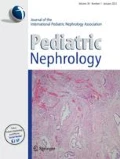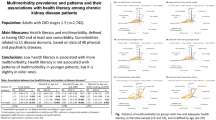Abstract
Background
Limited health literacy has been associated with adverse outcomes in children. We evaluated this association in the setting of chronic kidney disease (CKD).
Methods
We assessed the parental health literacy of 367 children enrolled in the Chronic Kidney Disease in Children (CKiD) Study, using the Short Test of Functional Health Literacy (STOFHLA). We evaluated the association between parental health literacy and CKD progression, defined as time to the composite event of renal replacement therapy (RRT, dialysis, or kidney transplant) or 50% decline in estimated glomerular filtration rate (eGFR).
Results
Median CKiD participant age was 9.5 years, 63% were male, and 59% non-Hispanic white. Median eGFR at baseline was 63 ml/min/1.73 m2, and median urine protein-to-creatinine ratio was 0.22. The median STOFHLA score was 98. Over a median follow-up of 3.7 years, the overall CKD progression rate was 2.8 per 100 person-years. After adjustment for demographic and clinical factors, the relative time to CKD progression was 28% longer per 1 SD increase in STOFHLA score (relative time, 95% CI, 1.28, 1.06–1.53).
Conclusions
In this cohort of children with CKD, higher parental health literacy was associated with a nearly 30% longer time to the composite CKD progression outcome.

Similar content being viewed by others
References
Chronic Kidney Disease (CKD) Surveillance Project. https://nccd.cdc.gov/ckd/detail.aspx?QNum=Q245. Accessed 4 Jan 2017
Read “Health literacy: a prescription to end confusion” at NAP.edu
America’s health literacy: why we need accessible health information. https://health.gov/communication/literacy/issuebrief/. Accessed 4 Jan 2017
DeWalt DA, Hink A (2009) Health literacy and child health outcomes: a systematic review of the literature. Pediatrics 124(Suppl 3):S265–S274
Furth SL, Cole SR, Moxey-Mims M, Kaskel F, Mak R, Schwartz G, Wong C, Muñoz A, Warady BA (2006) Design and methods of the chronic kidney disease in children (CKiD) prospective cohort study. Clin J Am Soc Nephrol 1:1006–1015
Furth SL, Abraham AG, Jerry-Fluker J, Schwartz GJ, Benfield M, Kaskel F, Wong C, Mak RH, Moxey-Mims M, Warady BA (2011) Metabolic abnormalities, cardiovascular disease risk factors, and GFR decline in children with chronic kidney disease. Clin J Am Soc Nephrol 6:2132–2140
Baker DW, Williams MV, Parker RM, Gazmararian JA, Nurss J (1999) Development of a brief test to measure functional health literacy. Patient Educ Couns 38:33–42
Taylor WL (1953) Cloze procedures: a new tool for measuring readability. JMCQ 30:415–433
Gunning R (1968) The technique of clear writing. McGraw Hill, New York
Baker DW, Gazmararian JA, Williams MV, Scott T, Parker RM, Green D, Ren J, Peel J (2002) Functional health literacy and the risk of hospital admission among Medicare managed care enrollees. Am J Public Health 92:1278–1283
Parker RM, Baker DW, Williams MV, Nurss JR (1995) The test of functional health literacy in adults: a new instrument for measuring patients’ literacy skills. J Gen Intern Med 10:537–541
Davis TC, Long SW, Jackson RH, Mayeaux EJ, George RB, Murphy PW, Crouch MA (1993) Rapid estimate of adult literacy in medicine: a shortened screening instrument. Fam Med 25:391–395
Baker DW (2006) The meaning and the measure of health literacy. J Gen Intern Med 21:878–883
Schwartz GJ, Muñoz A, Schneider MF, Mak RH, Kaskel F, Warady BA, Furth SL (2009) New equations to estimate GFR in children with CKD. J Am Soc Nephrol 20:629–637
Wong CS, Pierce CB, Cole SR, Warady BA, Mak RH, Benador NM, Kaskel F, Furth SL, Schwartz GJ, CKiD Investigators (2009) Association of proteinuria with race, cause of chronic kidney disease, and glomerular filtration rate in the chronic kidney disease in children study. Clin J Am Soc Nephrol 4:812–819
Rak EC, Hooper SR, Belsante MJ, Burnett O, Layton B, Tauer D, Mantoo B, DeWalt D, Ferris ME (2016) Caregiver word reading literacy and health outcomes among children treated in a pediatric nephrology practice. Clin Kidney J 9:510–515
Devraj R, Gordon EJ (2009) Health literacy and kidney disease: toward a new line of research. Am J Kidney Dis Off J Natl Kidney Found 53:884–889
Macabasco-O’Connell A, DeWalt DA, Broucksou KA, Hawk V, Baker DW, Schillinger D, Ruo B, Bibbins-Domingo K, Holmes GM, Erman B, Weinberger M, Pignone M (2011) Relationship between literacy, knowledge, self-care behaviors, and heart failure-related quality of life among patients with heart failure. J Gen Intern Med 26:979–986
Kalichman SC, Pope H, White D, Cherry C, Amaral CM, Swetzes C, Flanagan J, Kalichman MO (2008) Association between health literacy and HIV treatment adherence: further evidence from objectively measured medication adherence. J Int Assoc Physicians AIDS Care Chic Ill 2002 7:317–323
Wright Nunes JA, Wallston KA, Eden SK, Shintani AK, Ikizler TA, Cavanaugh KL (2011) Associations among perceived and objective disease knowledge and satisfaction with physician communication in patients with chronic kidney disease. Kidney Int 80:1344–1351
Morrison AK, Myrvik MP, Brousseau DC, Hoffmann RG, Stanley RM (2013) The relationship between parent health literacy and pediatric emergency department utilization: a systematic review. Acad Pediatr 13:421–429
Robinson LD, Calmes DP, Bazargan M (2008) The impact of literacy enhancement on asthma-related outcomes among underserved children. J Natl Med Assoc 100:892–896
Kiser K, Jonas D, Warner Z, Scanlon K, Shilliday BB, DeWalt DA (2012) A randomized controlled trial of a literacy-sensitive self-management intervention for chronic obstructive pulmonary disease patients. J Gen Intern Med 27:190–195
Baker DW, DeWalt DA, Schillinger D, Hawk V, Ruo B, Bibbins-Domingo K, Weinberger M, Macabasco-O'Connell A, Pignone M (2011) “Teach to goal”: theory and design principles of an intervention to improve heart failure self-management skills of patients with low health literacy. J Health Commun 16(Suppl 3):73–88
Kovesdy CP, Kalantar-Zadeh K (2012) Observational studies versus randomized controlled trials: avenues to causal inference in nephrology. Adv Chronic Kidney Dis 19:11–18
Funding
The CKiD Cohort Study was supported by the funding provided by the National Institute of Diabetes and Digestive and Kidney Diseases (NIDDK), the Eunice Kennedy Shriver National Institute of Child Health and Human Development, and the National Heart, Lung, and Blood Institute (U01-DK-66143, U01-DK-66174, U01-DK-082194, U01-DK-66116). Dr. Ricardo is funded by the NIDDK K23-DK-094829 Award. Dr. Lash is funded by the NIDDK K24-DK-092290 Award.
Author information
Authors and Affiliations
Consortia
Corresponding author
Ethics declarations
The study protocol was approved by the Institutional Review Boards at all participating sites and all participants gave written informed consent and/or assent.
Conflict of interest
The authors declare that they have no conflict of interest.
Rights and permissions
About this article
Cite this article
Ricardo, A.C., Pereira, L.N., Betoko, A. et al. Parental health literacy and progression of chronic kidney disease in children. Pediatr Nephrol 33, 1759–1764 (2018). https://doi.org/10.1007/s00467-018-3962-y
Received:
Revised:
Accepted:
Published:
Issue Date:
DOI: https://doi.org/10.1007/s00467-018-3962-y




